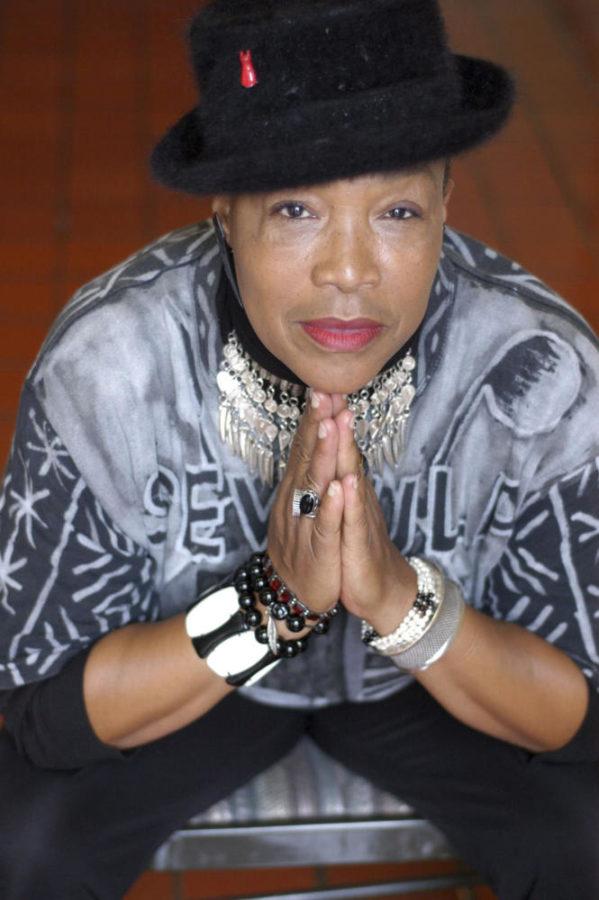Since she found theater, San Francisco-based artist Rhodessa Jones said she has always had a place in the world — whether it be to share her ups and downs or to offer other women a chance to speak out.
“Theater has been the one lover that has never let me down — it demands a lot of me, but then the rewards are abundant,” Jones, 69, said.
When Annabelle Clippinger, director of Pitt Arts, first saw Jones at the 2017 Americans for the Arts Conference, she was fascinated by her keynote address. From the audience’s reactions, Clippinger could feel the power of Jones’ dynamic personality — demonstrating Jones’ commitment to using art as a platform for social activism.
“Having seen her there, I was just stunned at what an incredible speaker she was and the story she had behind herself,” said Clippinger. “She makes a safe space for everyone to share their stories, and I think it’s because she shares so much.”
After researching more of Jones’ work, Clippinger knew Jones was the perfect person to be Pitt’s artist-in-residence for February 2018. In this role, Jones will host creative workshops three days a week and work with students from various departments to create an original show that will be performed Feb. 24 in Alumni Hall.
Jones’ work began in 1983 when she met her creative partner, Idris Ackamoor, through the nonprofit organization Cultural Odyssey — a company that organizes group workshops and performances to bring awareness to various social causes. Ackamoor started Cultural Odyssey in 1979 after an eye-opening discovery of the connection between interdisciplinary African artists and the community.
“My goal that I had 40 years ago is the same goal I have today — to support myself and Rhodessa as performing artists with the projects that we do,” said Ackamoor. “We both have gratitude about being able to do this artistic work — we are called upon to do this work.”
Furthering the initial goal of the company, Jones began to pursue an initiative of her own — encouraging storytelling through physical performance. Her idea grew out of an invitation from the California Arts Council, which had asked her to teach aerobics in the local jails of San Francisco. Fascinated by the idea of using aerobics to save the lives of incarcerated women, Jones gave the job a chance.
“I thought to myself, ‘Well, I’m not an aerobics teacher, but I’m a dancer and a performer.’ So I went in,” Jones said. “I found that they weren’t even interested in moving. They were depressed, ashamed and angry, because they had been judged by their context, not about their design.”
Building on this experience and her work with Cultural Odyssey, Jones started The Medea Project: Theater for Incarcerated Women — named after the intelligent sorceress Medea in Greek mythology — in 1989. She began by simply promoting laughter and encouraging the women to engage in physical activity.
By making connections and building trust with the women, Jones said she created an open environment where stories, even her own, could be shared. From asking simple personal questions to the formation of large scale ideas, The Medea Project allows inmates to express their past experiences through theater.
“As an illegitimate mother, I had a kid at 16. I’ve had my own struggles of shame,” Jones said. “I think in the 21st century, a lot of us are politically driven from day one, and a politically driven artist is an activist and is about social action and social change.”
The Medea Project expanded its initiatives in 2008, when the production joined with University of California San Francisco’s Women’s HIV Program to provide support for women living with HIV. Using theater as an exploration of self, HIV Circle drives women to find support in each other in essentially the same way that the original project does.
The mother company of Jones’ projects is Cultural Odyssey. As a proud mother, founder and theater guru, Ackamoor acknowledges the progressive way Jones has used her artistic talents to empower women.
“Her work with The Medea Project was her calling — it’s such a positive karma that she gives so much and the universe also gives back to her,” said Ackamoor. “Not every artist can do that. Not every artist can go to a jail and work with women who have been cast away from society.”
As co-artistic directors of their shared performance company, Jones and Ackamoor have a partnership filled with admiration for each other’s work. The two artists also sometimes perform together — they will both be on stage with Ackamoor’s jazz ensemble to celebrate Black History Month on Feb. 22 in the Charity Randall Theatre, in a show sponsored by Pitt Arts.
Together, Jones and and Ackamoor have been named U.S. Art Ambassadors by the U.S. Department of State Bureau of Educational and Cultural Affairs — granting them trips to present their work in South Africa and Europe.
Jones is currently working on “A Landscape of Desire” — a celebratory one-woman show about the importance of facing the future and letting go of youth. She plans to open the show in April 2018 as part of her series, “Facing 70.”
“I make art rooted in autobiographical theater because therein there’s a place for everybody, each of us are mythical creatures,” said Jones. “And if each one of us is interested in retelling your story, it’s rooted in appreciating the myth of your life.”


